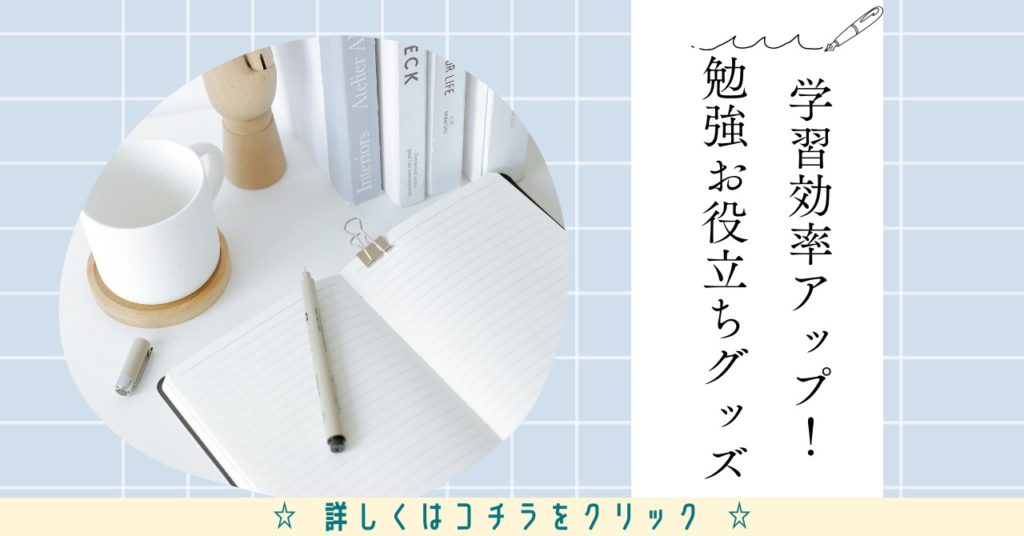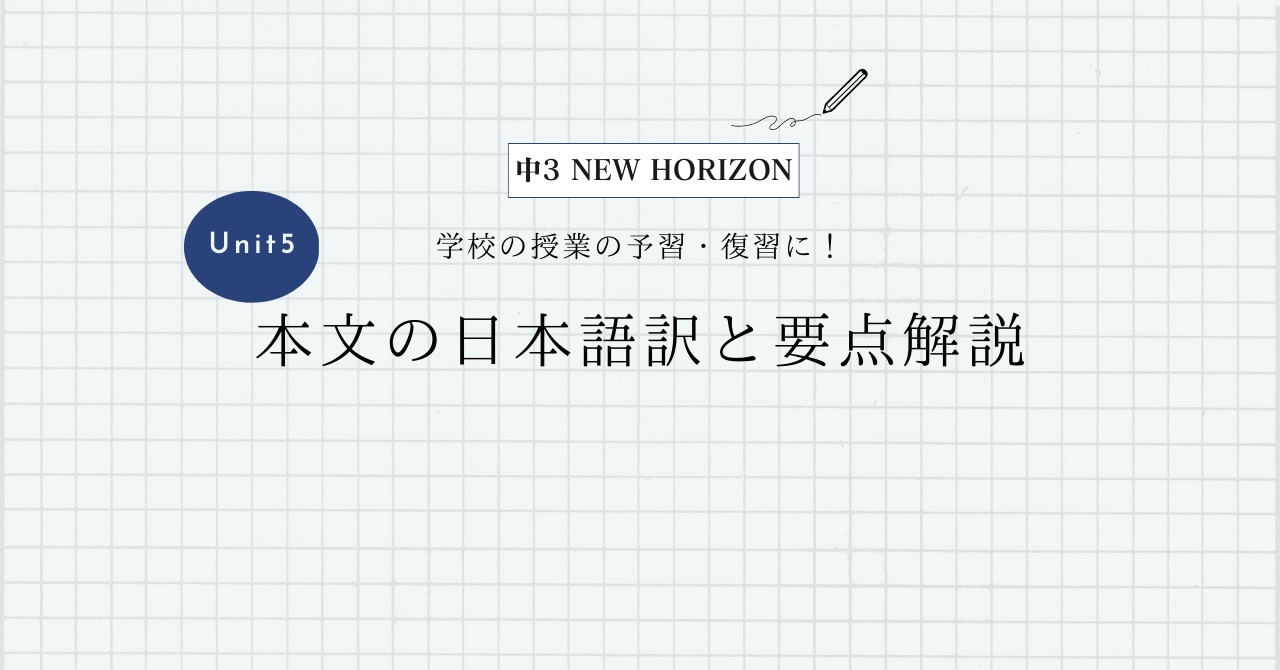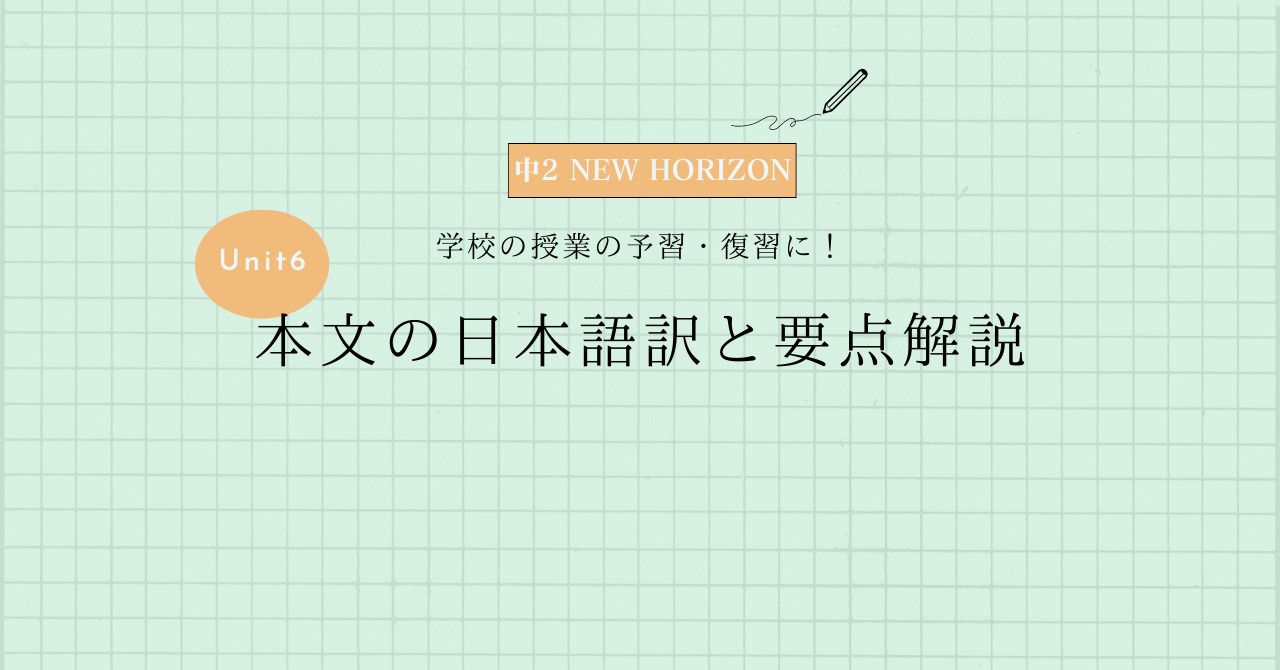東京書籍 中学3年生 NEW HORIZON(ニューホライズン) Unit6 Read & Think1の本文の日本語訳と重要箇所の解説です。
Unit6-1, 6-2の解説はこちらからご覧ください。
>中3NEW HORIZON Unit6 Scene1 本文和訳
>中3NEW HORIZON Unit6 Scene2 本文和訳
- Unit6 Read & Think1 本文と日本語訳
- Unit6 Read & Think1 重要事項の解説
- What is the main point Kaito is trying to tell us?
- Imagine your life without school.
- If you didn’t study, you couldn’t read or write.
- If you were illiterate, you couldn’t get information through books or websites.
- In some parts of the world, there are children living like this.
- Children like these in Afghanistan receive school backpacks from Japan.
- It makes them happy.
- It also encourages their parents to send their sons and daughters to school.
- Most of the backpacks come with pens and notebooks.
- So students will be ready for school.
- In areas with no school buildings, children can use the backpacks as desks in the open air.
- In these ways, school backpacks from Japan have been changing children’s lives.
- Other goods and services travel from one country to another all around the globe.
- These exchanges connect and help us all.
- Our borders are only lines on a map.
- Like most countries, Japan depends on foreign trade for its survival.
- Many things that we see every day come from overseas, such as food and clothes.
- For example, one-third of the chicken that we eat comes from other countries, like Brazil and Thailand.
- If we didn’t import chicken from these countries, fried chicken would be quite expensive in Japan.
- We depend on foreign countries even more for beef and pork.
- Also, about 90 percent of our clothes, shirts, pants, and coats, for example, are imported from China and other Asian countries.
- Actually, many products that are sold by Japanese companies are made in other countries.
- Electronic devices are no exception.
- We’re surrounded by imported products in our daily lives.
- Our relationships with foreign countries are becoming more and more interdependent.
- It’s necessary for us to continue helping each other ― beyond our borders.
- Unit6 Read & Think1 まとめ
Unit6 Read & Think1 本文と日本語訳
What is the main point Kaito is trying to tell us?
「カイトが私たちに伝えようとしている主要なポイントは何ですか?」
Imagine your life without school.
「学校がない生活を想像してみてください。」
If you didn’t study, you couldn’t read or write.
「もし勉強しなかったら,読んだり書いたりできないでしょう。」
If you were illiterate, you couldn’t get information through books or websites.
「もし読み書きができなかったら,本やウェブサイトを通して情報を手に入れられないでしょう。」
In some parts of the world, there are children living like this.
「世界のある地域では,このように生活している子どもたちがいます。」
Children like these in Afghanistan receive school backpacks from Japan.
「アフガニスタンのこのような子どもたちは日本からランドセルを受け取っています。」
It makes them happy.
「そのことによって彼らは幸せになっています。」
It also encourages their parents to send their sons and daughters to school.
「また,ランドセルは親が息子や娘を学校に行かせるのを励ましています。」
Most of the backpacks come with pens and notebooks.
「ランドセルのほとんどはペンとノートと一緒にやって来ます。」
So students will be ready for school.
「だから生徒は学校に行く用意ができるでしょう。」
In areas with no school buildings, children can use the backpacks as desks in the open air.
「学校の建物がない地域では,子どもたちは野外でランドセルを机として使うことができます。」
In these ways, school backpacks from Japan have been changing children’s lives.
「これらのように,日本のランドセルは子どもたちの生活を変え続けています。」
School backpacks from Japan travel to Afghanistan.
「ランドセルは日本からアフガニスタンまで旅しています。」
They help the school children there.
「ランドセルはそこで児童たちを助けています。」
Other goods and services travel from one country to another all around the globe.
「その他の商品やサービスも,ある国から世界中の別の国を旅しています。」
These exchanges connect and help us all.
「こういったやり取りは私たち全員を繋ぎ,そして助けます。」
Our borders are only lines on a map.
「私たちの境界は地図上ではただの線でしかありません。」
Like most countries, Japan depends on foreign trade for its survival.
「ほとんどの国と同じように,日本は生き残りのために外国貿易に頼っています。」
Many things that we see every day come from overseas, such as food and clothes.
「食べ物や服のような私たちが毎日見るものの多くは海外からやって来ています。」
For example, one-third of the chicken that we eat comes from other countries, like Brazil and Thailand.
「例えば,私たちが食べる鶏肉の3分の1はブラジルやタイのような他国から来ています。」
If we didn’t import chicken from these countries, fried chicken would be quite expensive in Japan.
「もし私たちがこれらの国から鶏肉を輸入しなかったら,日本でから揚げはかなり高くなるでしょう。」
We depend on foreign countries even more for beef and pork.
「牛肉と豚肉に関してはさらに外国に頼っています。」
Also, about 90 percent of our clothes, shirts, pants, and coats, for example, are imported from China and other Asian countries.
「また,例えば服,シャツ,ズボン,コートの約90%は中国と他のアジアの国から輸入されています。」
Actually, many products that are sold by Japanese companies are made in other countries.
「実際,日本の会社によって売られている多くの製品は他国で作られています。」
Electronic devices are no exception.
「電子機器も例外ではありません。」
We’re surrounded by imported products in our daily lives.
「日常において,私たちは輸入製品に囲まれています。」
Our relationships with foreign countries are becoming more and more interdependent.
「外国との関係はますます相互に依存していきています。」
It’s necessary for us to continue helping each other ― beyond our borders.
「私たちにとって,国境を越えてお互いを助け続けることが必要です。」

Unit6 Read & Think1 重要事項の解説
What is the main point Kaito is trying to tell us?
この文は「現在進行形」になってますね。“main”は「主な」という形容詞です。
“try to 動詞の原形”は「~しようとする」という意味で,挑戦してみたけどダメだったというようなニュアンスで使われることが多いです。難しいといった意味合いが含まれるということですね。
一方で“try 動名詞”は,「(試しに)~してみる」という表現になります。つまりその行為自体はできたという意味合いになります。
“tell”は「に言う,伝える」という動詞ですね。
Imagine your life without school.
この文は「命令文」になっていますね。
“imagine”は「を想像する」という動詞です。“without”は「~なしで」という前置詞ですね。
If you didn’t study, you couldn’t read or write.
この文は「仮定法過去」が使われていますね。現実とは違う「願望」を表す表現になります。
If you were illiterate, you couldn’t get information through books or websites.
この文も「仮定法過去」が使われていますね。
仮定法過去では,主語が何であってもbe動詞を使うときは”were”になる点に要注意です!
“information”は「情報」という名詞で,“through“は「~を通じて」という前置詞ですね。
In some parts of the world, there are children living like this.
“some”は「いくつかの,ある~」という形容詞で,“part”は「部分,地域」といった名詞です。
また,ここでは「there構文」も使われていますね。
さらに,“living”は「現在分詞」になっていて,直前の“children”を修飾しています。
“like this”は「このように」という表現になります。
Children like these in Afghanistan receive school backpacks from Japan.
“these”は“this”の複数形で「これらは,これらの」という意味です。
“receive”は「を受け取る」という動詞になります。
“school backpack”は「ランドセル」ですね。
It makes them happy.
“make A B”で「AをB(の状態)にする,させる」という重要表現です。Aには名詞,Bには名詞か形容詞が入ります。
“It”は直前の文全体を指していますね。
It also encourages their parents to send their sons and daughters to school.
“also”は「また,さらに」といった副詞で,付け加える役割があります。色々な文で使うので必ず覚えましょう!
“encourage”は「を励ます,勇気づける」という動詞で,“encourage 名詞 to 動詞の原形”で「名詞が~するのを励ます,促す」という意味になります。
“send 人 もの”で「人にものを送る」となって,“send もの to 人”でも同じ意味になります。
他には“teach”, “tell”,“give”, “show”などが同じ使い方をできるので必ず書き換えられるようにしておきましょう。
“parent”は「親」,“son”は「息子」,“daughter”は「娘」という名詞ですね。
Most of the backpacks come with pens and notebooks.
“most”は「ほとんどの」という形容詞で,“most of~”は「~のほとんど」という意味になります。
So students will be ready for school.
“so”は「だから」という接続詞になります。
“be ready for~”は「~の用意ができている」という意味になります。
In areas with no school buildings, children can use the backpacks as desks in the open air.
“area”は「地域」,“building”は「建物」という名詞ですね。
“with”は前置詞で「~と一緒に」と訳すことが多いですが,必ずしも後ろに人が来るわけではありません。イメージとして「~とセットで」と覚えておきましょう。
訳し方としては「~を使って」「~で」「~がある」など文脈に合わせて柔軟に変えてあげましょう。
“no”は形容詞で,名詞の複数形の前に付けると「ない」という否定の意味にできます。
“as”は「~として」という前置詞で,“open air”は「野外」という意味になりますよ。
In these ways, school backpacks from Japan have been changing children’s lives.
“in these ways”は“in this way”の複数形で,「これらのように」といった具合で訳せばOKです。
また,この文では「現在完了進行形」が使われていますね。
“lives”は“life(生活,人生)“の複数形で,語尾が”f,fe”で終わる名詞を複数形にするときは”f,fe”を取って”ves”をつけます。
knife→knives(ナイフ), leaf→leaves(葉)などがあります。
Other goods and services travel from one country to another all around the globe.
“other”は「他の」という形容詞で,“goods”は複数形で「商品」,“service”は「サービス」という名詞ですね。
“travel”は「旅行する」という動詞です。
“from A to B”は「AからBまで」となり,“one”は「ある」,“another”は「他の,別の」という意味になります。
“all around the globe”は“globe”が「地球」なので「世界中」という意味ですね。
These exchanges connect and help us all.
“exchange”は「交流,やり取り」という名詞で,“connect”は「を繋ぐ」という動詞ですね。
Our borders are only lines on a map.
“border”は「境界」,“line”は「線」という名詞です。
“only”は「ただ~だけ,~しか」という強調を表す副詞です。
Like most countries, Japan depends on foreign trade for its survival.
“like”は前置詞で「~のような」という意味ですね。
“depend on~”は「~に頼る,依存する」という重要表現です。
“foreign”は「外国の,海外の」という形容詞で,“trade”は「貿易,交換」,“survival”は「生存,生き残り」という名詞です。
Many things that we see every day come from overseas, such as food and clothes.
“thing”は「もの・こと」という名詞ですね。
また,ここでは「目的格の関係代名詞」も使われています。“that we see every day”が先行詞“things”を修飾していますよ。
“overseas”は「海外に・で」という副詞ですね。
“such as~”は「~のような,例えば」という重要表現で,“clothes”は「服」という名詞です。
For example, one-third of the chicken that we eat comes from other countries, like Brazil and Thailand.
“for example”は「例えば」という重要表現ですね。
“one-third”は「3分の1」という分数を表します。英語で分数は「数字+序数」で表現します。
「何分の1」は”one+序数”で,「分子が2以上」の場合は序数に”s”を付けます。
例えば「3分の2」は“two thirds”となります。
また,ここでは「目的格の関係代名詞」も使われています。“hat we eat”が先行詞“the chicken”を修飾していますよ。
If we didn’t import chicken from these countries, fried chicken would be quite expensive in Japan.
この文も「仮定法過去」が使われていますね。
“import”は「を輸入する」という動詞,“fried”は「揚げた」という形容詞です。
“quite”は「かなり,極めて」という副詞で,“expensive”は「高価な」という形容詞ですね。
We depend on foreign countries even more for beef and pork.
“even more”は「さらにいっそう」という意味になります。
“beef”は「牛肉」,“pork”は「豚肉」ですね。
Also, about 90 percent of our clothes, shirts, pants, and coats, for example, are imported from China and other Asian countries.
“about”は副詞で「約,およそ」という意味です。
また,この文は「受動態」が使われていますね。
Actually, many products that are sold by Japanese companies are made in other countries.
“actually”は「実は,実際は」という副詞です。
“product”は「製品」という名詞で,さらに「主格の関係代名詞」も使われています。“that are sold by Japanese companies”が先行詞“products”を修飾していますよ。
“company”は「会社」という名詞ですね。
Electronic devices are no exception.
“electronic”は「電気の」という形容詞で,“device”が「装置,機器」という名詞です。
“exception”は「例外」という名詞で,“be no exception”は「例外ではない」となりますよ。
We’re surrounded by imported products in our daily lives.
この文でも「受動態」が使われていますね。“surround”は「を囲む」という動詞です。
また,“imported”は「過去分詞」になっていて,直後の“products”を修飾しています。
“daily life”で「日常」となります。
Our relationships with foreign countries are becoming more and more interdependent.
この文では「現在進行形」が使われていますね。“relationship”は「関係」という名詞です。
“become”は「~になる」という動詞ですね。
“more and more”は「ますます」という意味で,“interdependent”は「相互依存の,持ちつもたれつ」という形容詞です。
It’s necessary for us to continue helping each other ― beyond our borders.
この文は「it to構文」になっていますね。“necessary”は「必要な,必須の」という形容詞です。
“continue”は「を続ける」という動詞で,“helping”は「動名詞」になっていますね。
“each other”は「お互い」という重要表現で,“beyond”は「を越えて」という前置詞になります。
「―」は「ダッシュ」といい,文や語句の後ろに置くことで補足説明をする役割がありますよ。

Unit6 Read & Think1 まとめ
以上がUnit6 Read & Think1の日本語訳となります。
ここでは「仮定法過去」が使われていますね。それ以外にも様々な文法が登場しているので,それぞれしっかり理解していきましょう!
>中3NEW HORIZON Unit6 Scene1 本文和訳
>中3NEW HORIZON Unit6 Scene2 本文和訳
何か分からない点や他に解説してほしい点があれば,お気軽にコメントしてください!




コメント